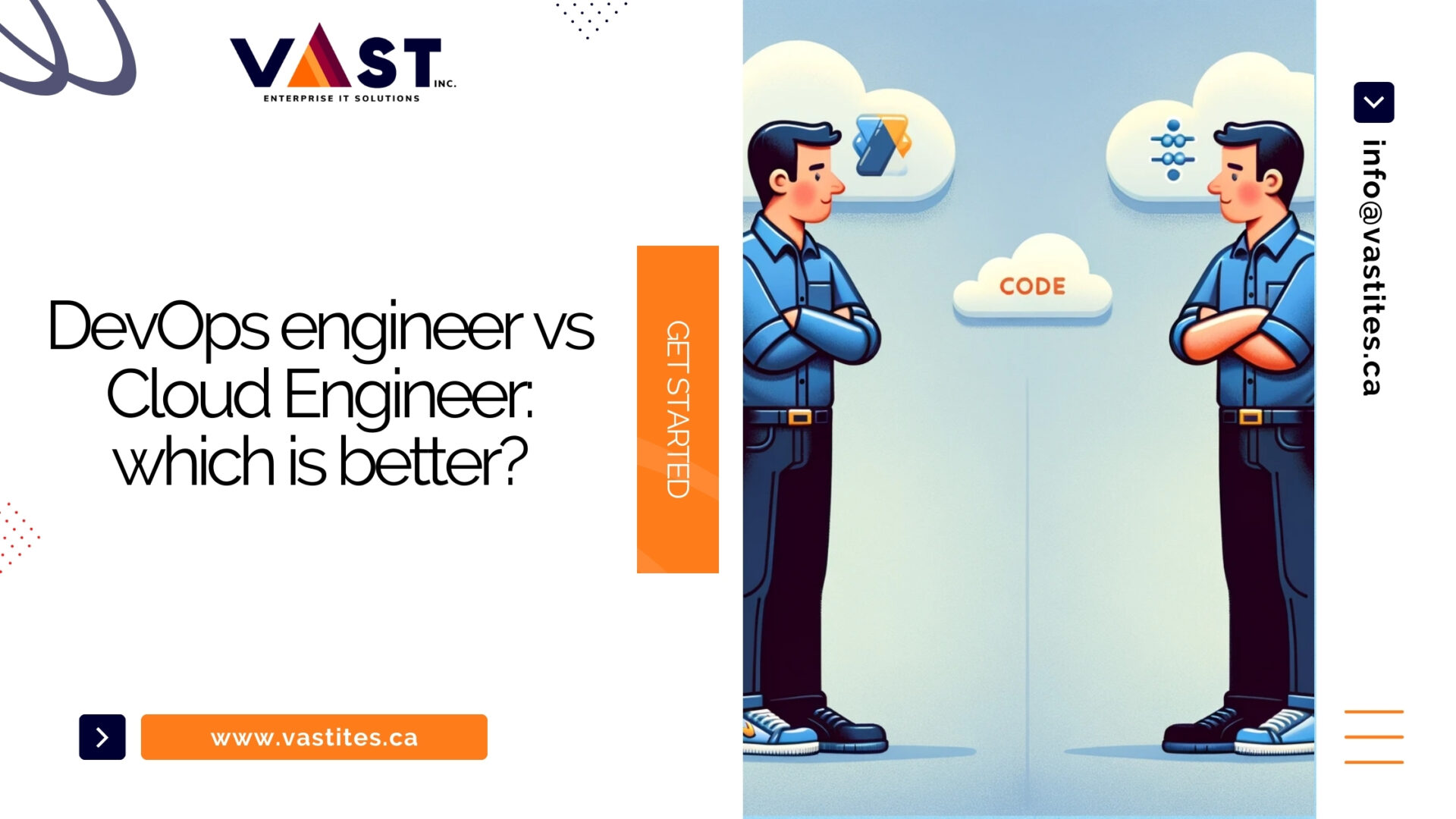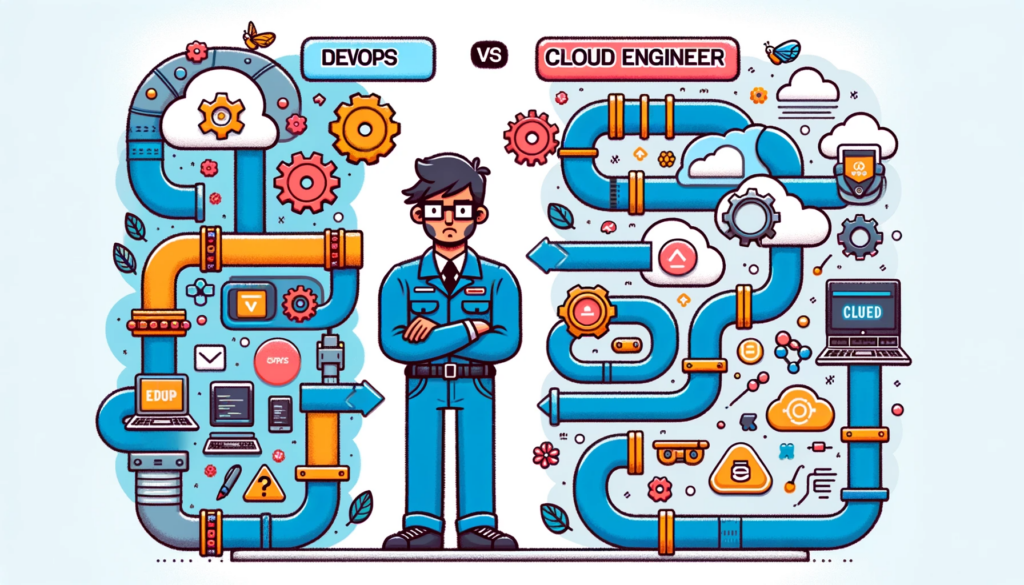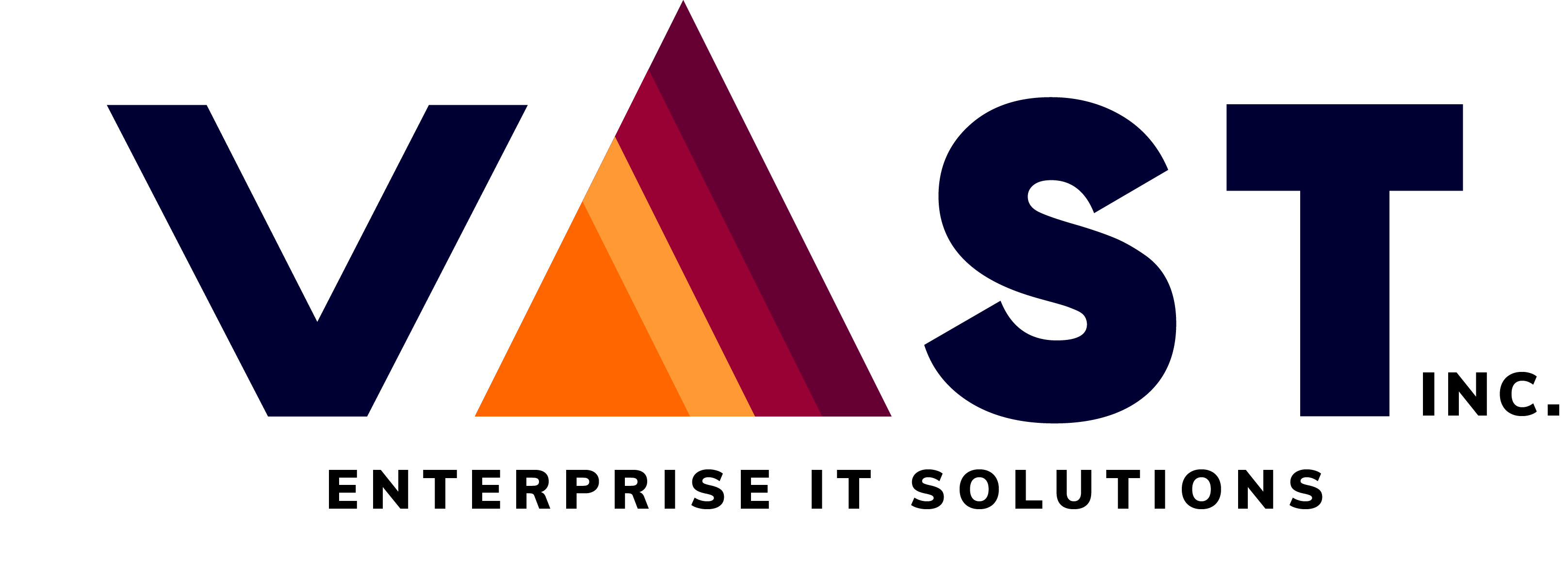
Introduction
In the quickly growing industry of Information Technology, two roles i.e DevOps engineer and cloud engineer, have arisen as crucial in forming the fate of software development and sending. While unmistakable, these jobs cross over and intertwine in the intricate dance of the current IT foundation. This blog expects to analyze and demystify the jobs of DevOps Engineers and Cloud engineers, investigating their obligations, abilities, and the differences and similarities between them. As the interest for more coordinated, versatile, and effective IT arrangements develops, understanding these jobs becomes urgent for organizations and experts too. Whether you’re a hopeful IT subject matter expert, an old pro hoping to grow your points of view, or a seasoned specialist trying to improve the mechanical scene, this investigation will give important bits of knowledge into two of the most pivotal and dynamic jobs in the present tech-driven world.
Who is a DevOps Engineer?
DevOps engineers are specialists who look after bridging the communication gap between development and communications teams. They are also responsible to automate the repetitive tasks and improve the deployment process. For high availability, scalability, fault tolerance, security, and disaster recovery, DevOps engineers must know how to build cloud infrastructure, virtual machines, and container images. They are automated with tools like Terraform and Packer.
To manage the deployments, these engineers generally use declarative code using tools like Ansible, Chef and Puppet.
DevOps Engineers are responsible for delivering and automating CI pipelines and characterizing and executing release strategies. Tools like Jenkins and Spinnaker can assist with automating your CI/CD pipeline. Application manipulation and debugging, management of databases and storage, monitoring, configuration, and security are all part of this.
Also read: Jenkins vs. Other CI/CD Tools: Making the Right Choice for your Project
Role of DevOps engineer
DevOps practices combine development and operations. DevOps isn’t a programming language, software, or tool. It is a bunch of practices that integrate software development and IT operations.
DevOps Engineers offer processes, tools, and practices to adjust necessities across the product development lifecycle, from coding and deployment to maintenance and updates. DevOps helps small, interdisciplinary, and independent teams to collaborate to accomplish shared objectives. Work together, automate, and take feedback from all partners and colleagues to drive you straightforwardly to item quality and faster delivery.
Some of the main role of a DevOps engineer in his day-to-day life are as follows:
- Continuous Integration and Continuous Deployment (CI/CD): They empower consistent and regular code integration, testing, and deployments. By designing, implementing, and managing automated CI/CD, they make it possible.
- Infrastructure as Code (IaC): Utilizing instruments like Terraform, Ansible, or CloudFormation to characterize and manage infrastructure utilizing code, taking into consideration reliable and reproducible conditions.
- Automation: Besides, these engineers foster scripts and tools to automate manual and repetitive tasks, like configuration management, deployment, monitoring, and scaling.
- Monitoring and Performance Improvement: Proactively identifying and resolving issues in order to guarantee high availability and reliability by implementing monitoring solutions to track the performance of applications and infrastructure.
- Collaboration: They ought to likewise work with the correspondence and collaboration between development, operations, and other cross-functional groups and consequently promote DevOps culture.
- Security and Compliance: The DevOps engineer job is to be fit for integrating security practices into the CI/CD pipeline. Additionally, it ought to adhere to relevant compliance standards and guarantee the safe deployment of code.
- Cloud Management: Overseeing cloud-based infrastructure, services, and resources, enhancing cloud use for cost-effectiveness and scalability.
- Troubleshooting and Incident Management: Researching and resolving issues, taking part in incident management, and carrying out preventive measures.
What are the skills required for a DevOps Engineer?
Here are some of the skills required for a DevOps Engineer that are necessary to carry out the core responsibilities:
- Version Control System: Expertise in Version Control Systems like Git to oversee and track changes in code repositories.
- Scripting and Programming Languages: DevOps Engineers should have legitimate knowledge of scripting languages like Python, Ruby, Bash, and programming languages like Java or C# for automating tasks and developing tools.
- Tools for CI/CD: Experience establishing automated build, test, and deployment pipelines using CI/CD tools such as Jenkins, GitLab CI/CD, or CircleCI
- Cloud Platforms: DevOps Engineers should be able to know all about significant cloud platforms like AWS, Azure, or Google Cloud Platform. They are therefore capable of deploying and managing cloud-based services.
- Configuration Management: Proficiency of configuration management tools like Ansible, Chef, or Puppet to manage and maintain infrastructure and application configurations.
- Containers and Container Orchestration: Another key expertise required is the knowledge of containerization technologies like Docker. Additionally, expertise in orchestration platforms like Kubernetes to oversee containerized applications.
- Monitoring and Logging Tools: Active involvement in monitoring and logging tools is another principal ability required for a DevOps engineer. Some of the tools include Prometheus, Grafana, and ELK stack (Elasticsearch, Logstash, Kibana) for tracking performance and issue diagnosis.
- Collaboration and Communication: Moreover, DevOps engineers should likewise have solid collaboration, communication, and critical thinking abilities. So they can work together actually with cross-functional groups and bring out improved results.
- Security Best Practices: Being aware of safety standards and best practices to guarantee secure software delivery and infrastructure management.
Implementing DevOps strategies cannot be an easy task. It is always recommended to consult an expert before trying anything new. VaST ITES Inc is the best DevOps Consulting in Toronto. They are seasoned experts in this field and have trust for many years. Contact them for your any DevOps and Cloud solutions.
Who is a Cloud Engineer?
A Cloud Engineer is a developer who has some expertise in the planning and improvement of cloud applications, as well as the building and support of cloud computing frameworks. They are accountable for the organization’s cloud projects, as well as for ensuring the security, scalability, and reliability of the cloud infrastructure.
Cloud engineers work with different cloud technologies and tools, including private, public and Hybrid cloud environments, as well as open cloud platforms, for example, Microsoft Azure, Amazon Web Services(AWS), and Google Cloud Platform.
Role of Cloud Engineers
Cloud Engineers are responsible for planning, executing, and managing cloud-based frameworks and services. Their main focus is on utilizing cloud computing technologies to build scalable, secure, and reliable solutions. They use tools like Terraform, Spinnaker, CloudFormation, etc.
They may likewise have some information on application architecture for cloud deployments. These configurations are important to execute profoundly accessible and adaptable cloud services.
Cloud engineers help businesses to build remote networks that they can move and perform on a large scale. They are also proficient with data backup, data analysis and software testing and development. These cloud architectures are large enough to serve multiple users and manage huge data.
The job of a cloud engineer is to make sure that the business only pays for the applications it needs, which will make cloud services cost less. Also, they are answerable for creating, developing, and monitoring the cloud technology and implementing regular checkups for issues. In order to guarantee the safety of the cloud applications, they must conduct security checks.
A few of the key roles of a Cloud engineer include:
- Management of Cloud Infrastructure: One of the key roles of a cloud engineer is to set up and configure the cloud environments which includes virtual machines, networks, security groups, and storage.
- Automation and Deployment: Creating automation scripts and formats to deploy and manage cloud resources effectively involving infrastructure as Code (IaC) tools.
- Security and Compliance: Executing security best practices, access controls, and encryption to guarantee data and applications are safeguarded. Guaranteeing compliance with industry standards and regulations.
- Monitoring and Performance Optimization: Checking cloud resources’ performance and proactively finding and solving issues to keep up with ideal system performance.
- Cost Optimization: A Cloud Engineer is responsible for analysing cloud usage and cost patterns optimizing spending and also recommending steps to cut the costs.
- Backup and Disaster Recovery: Planning and executing backup and disaster recovery techniques to guarantee data resilience and business progression.
- Documentation and Collaboration: Working with cross-functional groups to know application needs and teaming up on a collaboration plan. Keeping up with comprehensive documentation for cloud infrastructure and cycles.
What are the skills required for a Cloud Engineer?
To be an expert Cloud Engineer, you need to hone some skills. Here are some of the crucial skills required for a Cloud Engineer:
- Cloud Platform expertise: The primary skills required for a cloud engineer is to have knowledge about various cloud platforms like AWS, Microsoft Azure, Google Cloud Platform, etc.
- Networking skills: The cloud engineer should have a strong know-how about networking concepts like TCP/IP, VPC, VPN and other cloud-related networking services.
- Security Knowledge: Cloud engineers should have familiarity with the best practices, identity and access management (IAM) and encryption techniques.
- Automation and Scripting: He should be proficient with various programming languages like Python, PowerShell, Bash, etc. If he has experience with configuration management tools, then it would be cherry on top.
- Infrastructure as Code (IaC): Expertise with IaC tools like CloudFormation, Terraform or Azure Resource Manager templates.
- Monitoring and Troubleshooting: Cloud engineers are expected to set u monitoring and logging solutions to troubleshoot the errors effectively.
- Cloud Migration: One of the main skills is to able to migrate on-premise infrastructure to the cloud and understand the challenges that may occur.
- Continuous Learning: The cloud engineers’ job is to be updated with the ongoing trends in the market. In this way, they will be able to develop themselves well in the organization.
- Collaboration and Communication: He should be a strong team player and should be able to communicate properly to work with different teams and stakeholders.
Key Difference between DevOps engineer and Cloud Engineer

Although they may seem quite similar, but there is a huge difference between DevOps engineer and Cloud Engineer. Here are some of the key differences between DevOps Engineer and Cloud Engineer:
Goals and responsibility
The DevOps engineers look after bridging the communication gap between development and operations teams. They focus on automating and streamlining the manual and repetitive tasks to ease the software development process. On the other hand, cloud engineer majorly focuses on configuring, implementing and managing the cloud infrastructure and services. They are also responsible for configuring the virtual machines, networks and storage in the cloud environment to ensure the scalability and reliability of the application.
Skill set
Considering the skillset of DevOps engineer vs Cloud engineer, there are specific skills that are more focused on each of them. Cloud engineers need proficiency in popular cloud platforms (like AWS, Azure, GCP, etc.), security, and IaC tools. Whereas, DevOps engineers require good know-how in CI/CD pipelines, configuration management, version control systems, containerization, etc.
Scope
DevOps engineers have a broader scope of work than cloud engineers. Cloud engineers need to look after building and managing the cloud infrastructure. Whereas, DevOps engineers look after the integration of development and operation processes.
Team Collaboration
DevOps engineers collaborate with development and operations teams. They also collaborate with other IT teams to facilitate CI/CD practices across the environment. Whereas, cloud engineers collaborate with network engineers, system administration teams and security teams to configure and manage the cloud infrastructure.
Education
DevOps and cloud designs normally start their career paths with a four-year degree. Despite this similarity, each position may have distinct educational requirements. DevOps engineers, for instance, might choose to major in computer engineering, software development, or information technology. A cloud engineer, on the other hand, focuses more closely on cloud computing. In order to become a cloud engineer, you can study computer networking and information security, among other degrees.
Certification
DevOps designing is a broader profession field with numerous certificate opportunities for enhancing your abilities. You could, for instance, pursue credentials like the Microsoft Certified DevOps Engineer Expert or Cisco Certified DevNet Specialist—DevOps. There’s likewise a large number of certifications you can get past these.
There are several credentialing options for cloud engineering, but they are only available for cloud computation and operations. For example, the Google Association Cloud Engineer (ACE) qualification stretches out to a few unique regions of the fields utilizing this application. Certificates in other cloud-based applications like Microsoft Azure are additionally accessible for cloud engineers, however, the open doors for extra certificates in programming, development, and design are separate fields from cloud computing.
Salary
The salary potential for both DevOps and cloud engineers is similar, DevOps engineers can procure a higher yearly average of $121,945 each year. Interestingly, cloud engineers acquire a typical compensation of $117,624 each year. The lower pay range for cloud engineering compared to DevOps is another pay disparity. While cloud engineers can procure a typical base salary of $75,558 each year, DevOps designing shows a higher average of $80,409 each year.
DevOps Engineers vs Cloud Engineers: the similarities
DevOps and Cloud computing are two technologies that cross their paths at every point. Both teams need collaboration with each other to deliver fruitful outcomes. In someway they are quite similar, aiming for the same goal. Here some of the similarities between DevOps engineers and cloud engineers
- Cloud computing expertise: Both DevOps engineers and Cloud engineers require good knowledge of Cloud computing. DevOps engineers utilise this knowledge and apply it while integrating Continuous Integration and Continuous deployment pipelines. On the other hand, Cloud Engineers leverage this expertise in building and managing the cloud infrastructure.
- Automation: DevOps Engineer improves the communication and collaboration between the development and operations teams. They automate the repetitive tasks to enhance the software deployment. Cloud Engineers use automation to build and oversee cloud resources.
- Continuous Improvement: Continuous Improvement is necessary in both cases to strive the software development process. DevOps Engineer’s main focus is to enhance the development and deployment process and make it faster and more reliable. While, Cloud engineers focus on cost optimization and performance improvement.
- Collaboration: Both, DevOps engineers and cloud engineers, communicate and collaborate with cross-functional teams in their day-to-day chores.
DevOps Engineer vs Cloud Engineer: Career Scope
DevOps engineers have a more extensive range of abilities contrasted with Cloud engineers, making them a superset in the field. Both DevOps engineers and Cloud engineers have promising career paths, and their fates are interconnected as organizations progressively adopt cloud technologies and DevOps practices. Due to their ability to effectively bridge the gap between cloud infrastructure management and development, professionals with a combination of skills in both areas may find themselves in even greater demand. At last, picking between these jobs ought to be founded on individual interests, abilities, and professional goals, as the two ways offer energizing open doors in the IT industry.
Also read: What is the role of AWS in DevOps? AWS vs DevOps Jobs in Toronto
Conclusion
All in all, the jobs of DevOps Engineers and Cloud Engineers, however particular in their centre liabilities and ranges of abilities, are both basic to the cutting-edge IT scene. The DevOps engineers centre around overcoming any barrier between development and operations, ensuring continuous integration and deployment, while the Cloud Engineer has expertise in the configuration, execution, and maintenance of cloud infrastructure, guaranteeing scalability, security, and efficiency. As innovation keeps on developing, experts in these jobs should adjust to new tools, practices, and challenges.
For those considering a profession in one or the other field, the decision ought to line up with their inclinations, resources, and career goals. The two ways offer rich open doors for development, advancement, and commitment to the consistently impacting universe of innovation. Eventually, whether working together or freely, DevOps and Cloud engineers assume a basic part in forming the fate of digital landscapes, driving organizations and enterprises towards stronger, agile, and advanced technological solutions.
